英汉语言对比论文范文
- 格式:docx
- 大小:45.60 KB
- 文档页数:8
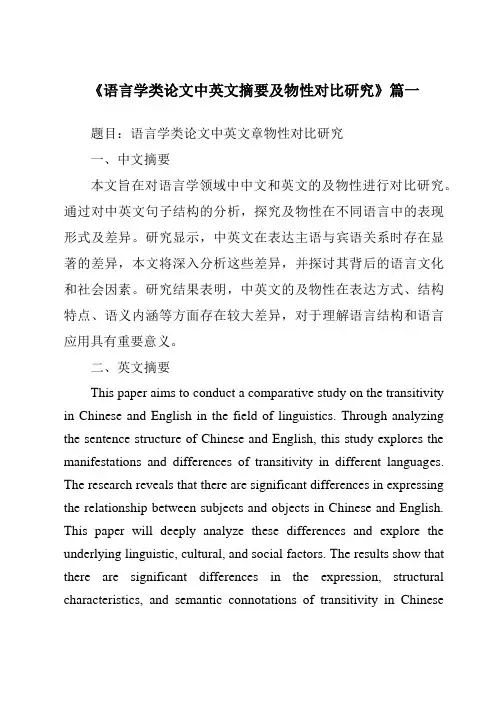
《语言学类论文中英文摘要及物性对比研究》篇一题目:语言学类论文中英文章物性对比研究一、中文摘要本文旨在对语言学领域中中文和英文的及物性进行对比研究。
通过对中英文句子结构的分析,探究及物性在不同语言中的表现形式及差异。
研究显示,中英文在表达主语与宾语关系时存在显著的差异,本文将深入分析这些差异,并探讨其背后的语言文化和社会因素。
研究结果表明,中英文的及物性在表达方式、结构特点、语义内涵等方面存在较大差异,对于理解语言结构和语言应用具有重要意义。
二、英文摘要This paper aims to conduct a comparative study on the transitivity in Chinese and English in the field of linguistics. Through analyzing the sentence structure of Chinese and English, this study explores the manifestations and differences of transitivity in different languages. The research reveals that there are significant differences in expressing the relationship between subjects and objects in Chinese and English. This paper will deeply analyze these differences and explore the underlying linguistic, cultural, and social factors. The results show that there are significant differences in the expression, structural characteristics, and semantic connotations of transitivity in Chineseand English, which are of great significance for understanding language structure and application.三、物性对比研究在语言学领域,及物性是一个重要的概念,它涉及到句子中主语与宾语的关系。
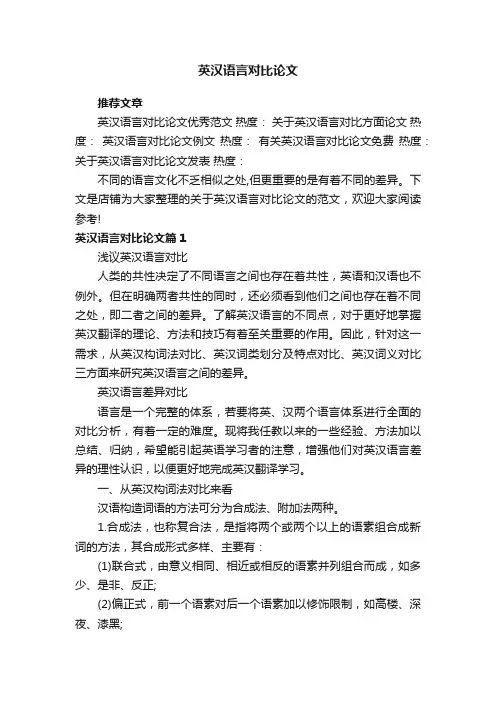
英汉语言对比论文推荐文章英汉语言对比论文优秀范文热度:关于英汉语言对比方面论文热度:英汉语言对比论文例文热度:有关英汉语言对比论文免费热度:关于英汉语言对比论文发表热度:不同的语言文化不乏相似之处,但更重要的是有着不同的差异。
下文是店铺为大家整理的关于英汉语言对比论文的范文,欢迎大家阅读参考!英汉语言对比论文篇1浅议英汉语言对比人类的共性决定了不同语言之间也存在着共性,英语和汉语也不例外。
但在明确两者共性的同时,还必须看到他们之间也存在着不同之处,即二者之间的差异。
了解英汉语言的不同点,对于更好地掌握英汉翻译的理论、方法和技巧有着至关重要的作用。
因此,针对这一需求,从英汉构词法对比、英汉词类划分及特点对比、英汉词义对比三方面来研究英汉语言之间的差异。
英汉语言差异对比语言是一个完整的体系,若要将英、汉两个语言体系进行全面的对比分析,有着一定的难度。
现将我任教以来的一些经验、方法加以总结、归纳,希望能引起英语学习者的注意,增强他们对英汉语言差异的理性认识,以便更好地完成英汉翻译学习。
一、从英汉构词法对比来看汉语构造词语的方法可分为合成法、附加法两种。
1.合成法,也称复合法,是指将两个或两个以上的语素组合成新词的方法,其合成形式多样、主要有:(1)联合式,由意义相同、相近或相反的语素并列组合而成,如多少、是非、反正;(2)偏正式,前一个语素对后一个语素加以修饰限制,如高楼、深夜、漆黑;(3)主谓式,前一语素为陈述对象,后一语素对之加以陈述,如心跳、胆小、地震;(4)动宾式,前一语素表示行为或动作,后一语素表示行为或动作的对象,如讲理、操心、说谎;(5)补充式,后一语素对前一语素加以补充说明,如改正、打开、分明。
2.附加法,亦称加缀法,是指通过在词根前加前缀或在其后面加后缀构造新词的方法。
汉语词缀表达的意义不像英语那样丰富繁多,往往一缀一义,极为严格,如汉语当中“老”这个前缀,老家(hometown)、老师(teacher)、老虎 (tiger)、老鼠 (mouse)、老外 (foreigner),虽然汉语是同一个“老”字,但组成不同的词语后意思却相应地发生了变化。
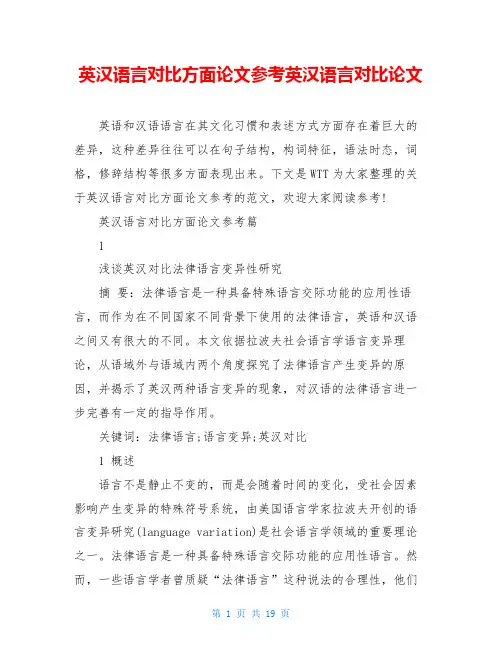
英汉语言对比方面论文参考英汉语言对比论文英语和汉语语言在其文化习惯和表述方式方面存在着巨大的差异,这种差异往往可以在句子结构,构词特征,语法时态,词格,修辞结构等很多方面表现出来。
下文是WTT为大家整理的关于英汉语言对比方面论文参考的范文,欢迎大家阅读参考!英汉语言对比方面论文参考篇1浅谈英汉对比法律语言变异性研究摘要:法律语言是一种具备特殊语言交际功能的应用性语言,而作为在不同国家不同背景下使用的法律语言,英语和汉语之间又有很大的不同。
本文依据拉波夫社会语言学语言变异理论,从语域外与语域内两个角度探究了法律语言产生变异的原因,并揭示了英汉两种语言变异的现象,对汉语的法律语言进一步完善有一定的指导作用。
关键词:法律语言;语言变异;英汉对比1 概述语言不是静止不变的,而是会随着时间的变化,受社会因素影响产生变异的特殊符号系统,由美国语言学家拉波夫开创的语言变异研究(language variation)是社会语言学领域的重要理论之一。
法律语言是一种具备特殊语言交际功能的应用性语言。
然而,一些语言学者曾质疑“法律语言”这种说法的合理性,他们认为“法律语言”是民族大众语的一部分,不能称作一门独立的语言而存在。
确实,法律并没有使用完全区别于民族大众语的独立语言,但是,廖美珍教授指出,“法律语言具有不同于民族大众语的其自身的显著特点。
正是这些显著的特点足以将从事法律活动的语言称之为‘法律语言’”。
为了法律交际和发展的需要,法律语言作为民族大众语言的一种语言变体,在发展的过程中,形成了与民族大众语言不同的发音、语法或词汇。
无论在中国还是在西方国家,这种发生在法律语言上的变化都是一个漫长的过程且值得关注的。
本文主要研究的是在英汉两种法律语言中形成此种变异的原因、现象与影响,拟通过对比英汉两种法律语言在语音、语法等具体语言因素上的异同,探究揭示法律语言的变异规律及其本质特征,以期对汉语的法律语言之完善起到些微作用。
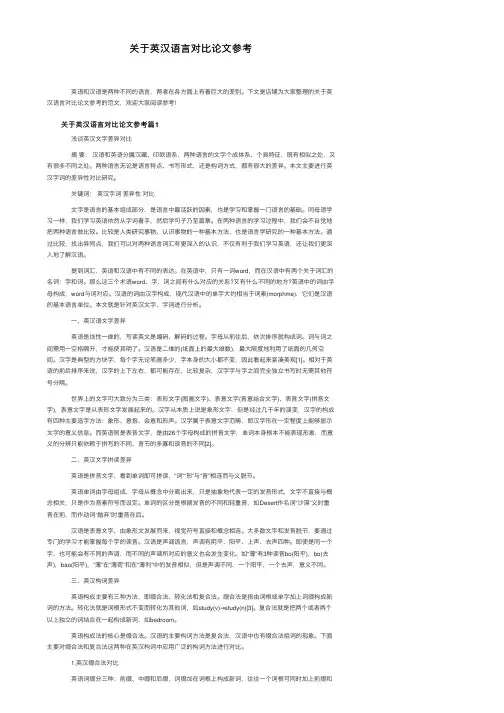
关于英汉语⾔对⽐论⽂参考 英语和汉语是两种不同的语⾔,两者在各⽅⾯上有着巨⼤的差别。
下⽂是店铺为⼤家整理的关于英汉语⾔对⽐论⽂参考的范⽂,欢迎⼤家阅读参考! 关于英汉语⾔对⽐论⽂参考篇1 浅谈英汉⽂字差异对⽐ 摘要:汉语和英语分属汉藏、印欧语系,两种语⾔的⽂字个成体系、个具特征,既有相似之处,⼜有很多不同之处。
两种语⾔⽆论是语⾔特点、书写形式,还是构词⽅式,都有很⼤的差异。
本⽂主要进⾏英汉字词的差异性对⽐研究。
关键词:英汉字词差异性对⽐ ⽂字是语⾔的基本组成部分,是语⾔中最活跃的因素,也是学习和掌握⼀门语⾔的基础。
同母语学习⼀样,我们学习英语依然从字词着⼿,然后学句⼦乃⾄篇章。
在两种语⾔的学习过程中,我们会不⾃觉地把两种语⾔做⽐较。
⽐较是⼈类研究事物、认识事物的⼀种基本⽅法,也是语⾔学研究的⼀种基本⽅法。
通过⽐较,找出异同点,我们可以对两种语⾔词汇有更深⼊的认识,不仅有利于我们学习英语,还让我们更深⼊地了解汉语。
提到词汇,英语和汉语中有不同的表达。
在英语中,只有⼀词word,⽽在汉语中有两个关于词汇的名词:字和词。
那么这三个术语word、字、词之间有什么对应的关系?⼜有什么不同的地⽅?英语中的词由字母构成,word与词对应。
汉语的词由汉字构成,现代汉语中的单字⼤约相当于词素(morphme),它们是汉语的基本语⾔单位。
本⽂就是针对英汉⽂字、字词进⾏分析。
⼀、英汉语⽂字差异 英语是线性⼀维的,写读英⽂是编码、解码的过程。
字母从前往后,依次排序就构成词。
词与词之间需⽤⼀空格隔开,才能使其明了。
汉语是⼆维的(纸⾯上的最⼤维数),最⼤限度地利⽤了纸⾯的⼏何空间。
汉字是典型的⽅块字,每个字⽆论笔画多少,字本⾝的⼤⼩都不变,因此看起来紧凑美观[1]。
相对于英语的前后排序来说,汉字的上下左右,都可能存在,⽐较复杂,汉字字与字之间完全独⽴书写时⽆需其他符号分隔。
世界上的⽂字可⼤致分为三类:表形⽂字(图画⽂字)、表意⽂字(⾳意结合⽂字)、表⾳⽂字(拼⾳⽂字),表意⽂字是从表形⽂字发展起来的。
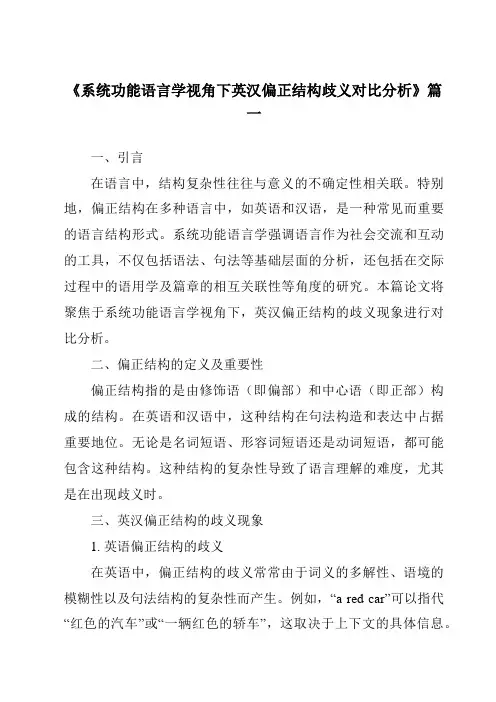
《系统功能语言学视角下英汉偏正结构歧义对比分析》篇一一、引言在语言中,结构复杂性往往与意义的不确定性相关联。
特别地,偏正结构在多种语言中,如英语和汉语,是一种常见而重要的语言结构形式。
系统功能语言学强调语言作为社会交流和互动的工具,不仅包括语法、句法等基础层面的分析,还包括在交际过程中的语用学及篇章的相互关联性等角度的研究。
本篇论文将聚焦于系统功能语言学视角下,英汉偏正结构的歧义现象进行对比分析。
二、偏正结构的定义及重要性偏正结构指的是由修饰语(即偏部)和中心语(即正部)构成的结构。
在英语和汉语中,这种结构在句法构造和表达中占据重要地位。
无论是名词短语、形容词短语还是动词短语,都可能包含这种结构。
这种结构的复杂性导致了语言理解的难度,尤其是在出现歧义时。
三、英汉偏正结构的歧义现象1. 英语偏正结构的歧义在英语中,偏正结构的歧义常常由于词义的多解性、语境的模糊性以及句法结构的复杂性而产生。
例如,“a red car”可以指代“红色的汽车”或“一辆红色的轿车”,这取决于上下文的具体信息。
2. 汉语偏正结构的歧义在汉语中,偏正结构的歧义同样普遍。
例如,“红色苹果”可以理解为“苹果的颜色是红色”或“一种名为‘红色’的苹果品种”。
这种歧义的产生往往与汉字的多义性、语序的灵活性和语境的差异有关。
四、系统功能语言学视角下的对比分析从系统功能语言学的角度来看,英汉偏正结构的歧义对比分析可以从以下几个方面进行:1. 语法与句法:对比分析英汉偏正结构的语法规则和句法结构,探讨其差异和相似之处。
2. 语用学:分析语境对偏正结构歧义的影响,探讨不同文化背景下的语言使用习惯和交际策略。
3. 篇章分析:从篇章的角度出发,分析偏正结构在篇章中的相互关联性和作用,探讨其在篇章构建中的重要性。
五、结论通过对英汉偏正结构的歧义对比分析,我们可以发现,无论是英语还是汉语,偏正结构都是语言中常见且重要的结构形式。
然而,由于词义的多解性、语境的模糊性以及句法结构的复杂性等因素的影响,这种结构往往会产生歧义。
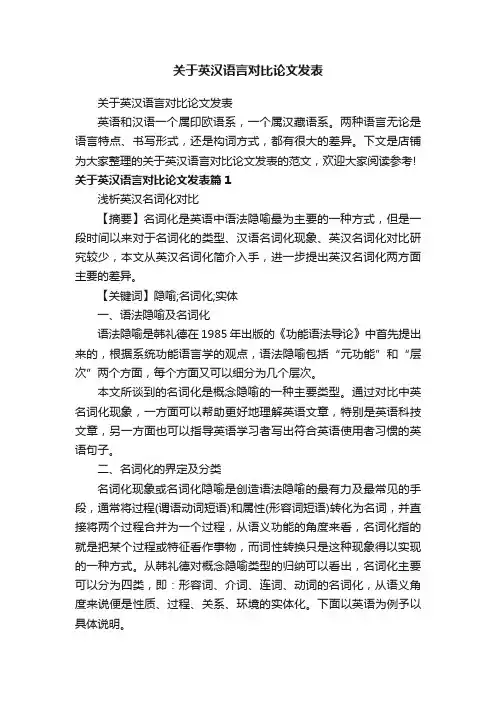
关于英汉语言对比论文发表关于英汉语言对比论文发表英语和汉语一个属印欧语系,一个属汉藏语系。
两种语言无论是语言特点、书写形式,还是构词方式,都有很大的差异。
下文是店铺为大家整理的关于英汉语言对比论文发表的范文,欢迎大家阅读参考! 关于英汉语言对比论文发表篇1浅析英汉名词化对比【摘要】名词化是英语中语法隐喻最为主要的一种方式,但是一段时间以来对于名词化的类型、汉语名词化现象、英汉名词化对比研究较少,本文从英汉名词化简介入手,进一步提出英汉名词化两方面主要的差异。
【关键词】隐喻;名词化;实体一、语法隐喻及名词化语法隐喻是韩礼德在1985年出版的《功能语法导论》中首先提出来的,根据系统功能语言学的观点,语法隐喻包括“元功能”和“层次”两个方面,每个方面又可以细分为几个层次。
本文所谈到的名词化是概念隐喻的一种主要类型。
通过对比中英名词化现象,一方面可以帮助更好地理解英语文章,特别是英语科技文章,另一方面也可以指导英语学习者写出符合英语使用者习惯的英语句子。
二、名词化的界定及分类名词化现象或名词化隐喻是创造语法隐喻的最有力及最常见的手段,通常将过程(谓语动词短语)和属性(形容词短语)转化为名词,并直接将两个过程合并为一个过程,从语义功能的角度来看,名词化指的就是把某个过程或特征看作事物,而词性转换只是这种现象得以实现的一种方式。
从韩礼德对概念隐喻类型的归纳可以看出,名词化主要可以分为四类,即:形容词、介词、连词、动词的名词化,从语义角度来说便是性质、过程、关系、环境的实体化。
下面以英语为例予以具体说明。
1.将过程看作实体在英语中过程一般是用动词来表示的,但是名词也可以表示动词的作用,如:[1A]The police investigated the matter.[1B]The police conducted an investigation into the matter.在例句[1A]中“investigated”用来表示一种动作,而在[1B]中这种动作也可以用名词“investigation”来表示。
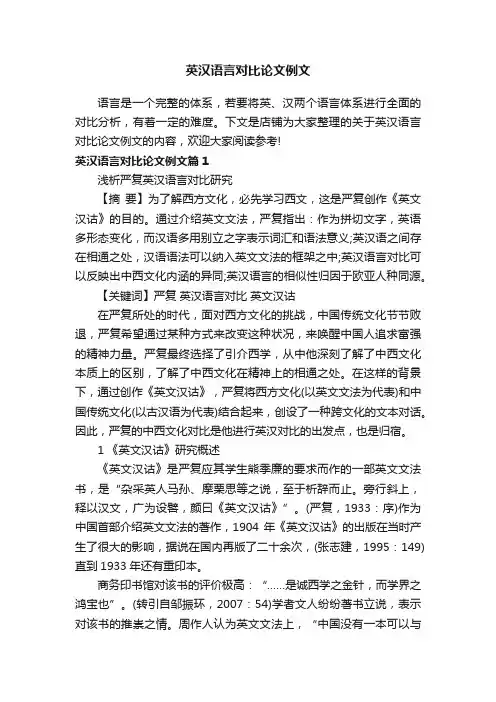
英汉语言对比论文例文语言是一个完整的体系,若要将英、汉两个语言体系进行全面的对比分析,有着一定的难度。
下文是店铺为大家整理的关于英汉语言对比论文例文的内容,欢迎大家阅读参考!英汉语言对比论文例文篇1浅析严复英汉语言对比研究【摘要】为了解西方文化,必先学习西文,这是严复创作《英文汉诂》的目的。
通过介绍英文文法,严复指出:作为拼切文字,英语多形态变化,而汉语多用别立之字表示词汇和语法意义;英汉语之间存在相通之处,汉语语法可以纳入英文文法的框架之中;英汉语言对比可以反映出中西文化内涵的异同;英汉语言的相似性归因于欧亚人种同源。
【关键词】严复英汉语言对比英文汉诂在严复所处的时代,面对西方文化的挑战,中国传统文化节节败退,严复希望通过某种方式来改变这种状况,来唤醒中国人追求富强的精神力量。
严复最终选择了引介西学,从中他深刻了解了中西文化本质上的区别,了解了中西文化在精神上的相通之处。
在这样的背景下,通过创作《英文汉诂》,严复将西方文化(以英文文法为代表)和中国传统文化(以古汉语为代表)结合起来,创设了一种跨文化的文本对话。
因此,严复的中西文化对比是他进行英汉对比的出发点,也是归宿。
1 《英文汉诂》研究概述《英文汉诂》是严复应其学生熊季廉的要求而作的一部英文文法书,是“杂采英人马孙、摩栗思等之说,至于析辞而止。
旁行斜上,释以汉文,广为设譬,颜曰《英文汉诂》”。
(严复,1933:序)作为中国首部介绍英文文法的著作,1904年《英文汉诂》的出版在当时产生了很大的影响,据说在国内再版了二十余次,(张志建,1995:149)直到1933年还有重印本。
商务印书馆对该书的评价极高:“……是诚西学之金针,而学界之鸿宝也”。
(转引自邹振环,2007:54)学者文人纷纷著书立说,表示对该书的推崇之情。
周作人认为英文文法上,“中国没有一本可以与《英文汉诂》相比的书”。
(钟叔和,1998:784-785)彦惠庆(2003:18)在自传中明确表示严复贡献给中国学人的《英文汉诂》“堪称学术精品”。
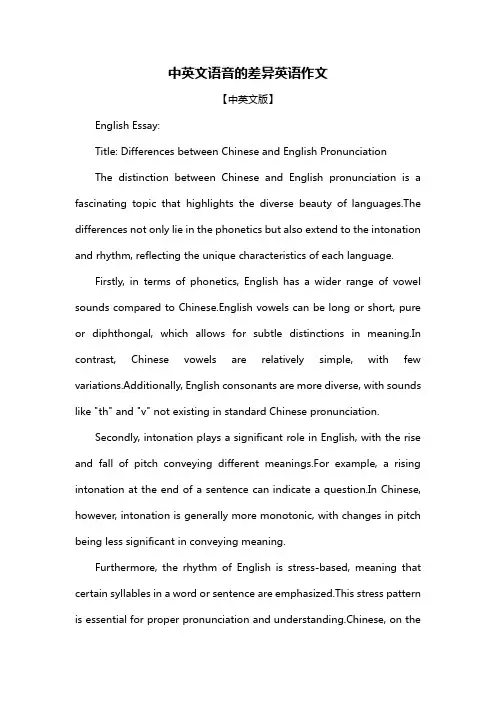
中英文语音的差异英语作文【中英文版】English Essay:Title: Differences between Chinese and English PronunciationThe distinction between Chinese and English pronunciation is a fascinating topic that highlights the diverse beauty of languages.The differences not only lie in the phonetics but also extend to the intonation and rhythm, reflecting the unique characteristics of each language.Firstly, in terms of phonetics, English has a wider range of vowel sounds compared to Chinese.English vowels can be long or short, pure or diphthongal, which allows for subtle distinctions in meaning.In contrast, Chinese vowels are relatively simple, with few variations.Additionally, English consonants are more diverse, with sounds like "th" and "v" not existing in standard Chinese pronunciation.Secondly, intonation plays a significant role in English, with the rise and fall of pitch conveying different meanings.For example, a rising intonation at the end of a sentence can indicate a question.In Chinese, however, intonation is generally more monotonic, with changes in pitch being less significant in conveying meaning.Furthermore, the rhythm of English is stress-based, meaning that certain syllables in a word or sentence are emphasized.This stress pattern is essential for proper pronunciation and understanding.Chinese, on theother hand, is a tone language, where different pitches can change the meaning of a word.The rhythmic pattern of Chinese emphasizes the even distribution of each syllable, which contrasts with the stress-based rhythm of English.Lastly, the articulation of sounds also differs.English speakers often use lip rounding and tension in the throat to produce specific sounds, while Chinese pronunciation tends to focus more on the use of the tongue and the movement of the jaw.In conclusion, the differences between Chinese and English pronunciation are multifaceted, encompassing phonetics, intonation, rhythm, and articulation.Understanding these differences can greatly aid language learners in mastering both languages effectively.中文作文:标题:中英文语音的差异中英文语音的差异是一个引人入胜的话题,它展现了语言的多样性美。
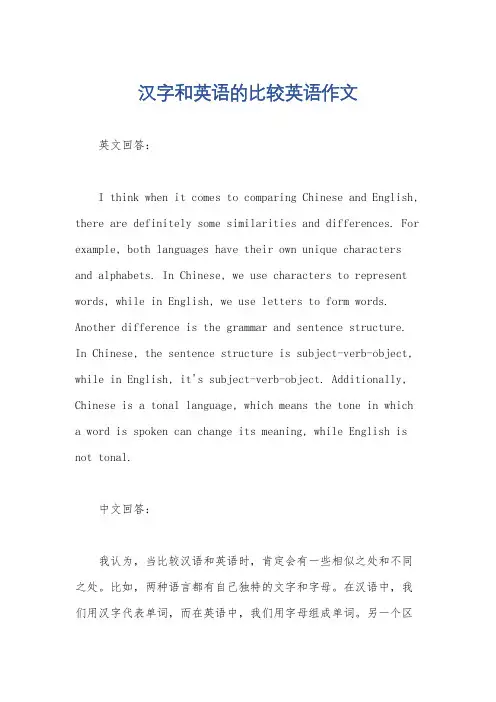
汉字和英语的比较英语作文英文回答:I think when it comes to comparing Chinese and English, there are definitely some similarities and differences. For example, both languages have their own unique characters and alphabets. In Chinese, we use characters to represent words, while in English, we use letters to form words. Another difference is the grammar and sentence structure. In Chinese, the sentence structure is subject-verb-object, while in English, it's subject-verb-object. Additionally, Chinese is a tonal language, which means the tone in which a word is spoken can change its meaning, while English is not tonal.中文回答:我认为,当比较汉语和英语时,肯定会有一些相似之处和不同之处。
比如,两种语言都有自己独特的文字和字母。
在汉语中,我们用汉字代表单词,而在英语中,我们用字母组成单词。
另一个区别是语法和句子结构。
在汉语中,句子结构是主谓宾,而在英语中是主谓宾。
此外,汉语是一种声调语言,这意味着一个词所发音的语调可以改变它的意思,而英语则不是声调语言。
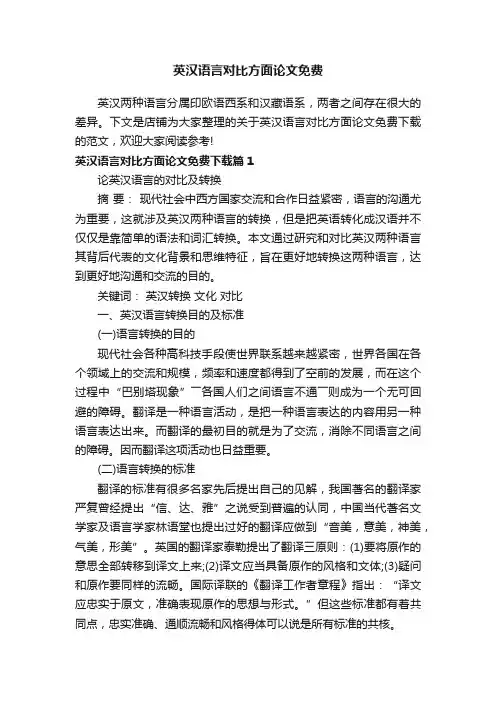
英汉语言对比方面论文免费英汉两种语言分属印欧语西系和汉藏语系,两者之间存在很大的差异。
下文是店铺为大家整理的关于英汉语言对比方面论文免费下载的范文,欢迎大家阅读参考!英汉语言对比方面论文免费下载篇1论英汉语言的对比及转换摘要:现代社会中西方国家交流和合作日益紧密,语言的沟通尤为重要,这就涉及英汉两种语言的转换,但是把英语转化成汉语并不仅仅是靠简单的语法和词汇转换。
本文通过研究和对比英汉两种语言其背后代表的文化背景和思维特征,旨在更好地转换这两种语言,达到更好地沟通和交流的目的。
关键词:英汉转换文化对比一、英汉语言转换目的及标准(一)语言转换的目的现代社会各种高科技手段使世界联系越来越紧密,世界各国在各个领域上的交流和规模,频率和速度都得到了空前的发展,而在这个过程中“巴别塔现象”――各国人们之间语言不通――则成为一个无可回避的障碍。
翻译是一种语言活动,是把一种语言表达的内容用另一种语言表达出来。
而翻译的最初目的就是为了交流,消除不同语言之间的障碍。
因而翻译这项活动也日益重要。
(二)语言转换的标准翻译的标准有很多名家先后提出自己的见解,我国著名的翻译家严复曾经提出“信、达、雅”之说受到普遍的认同,中国当代著名文学家及语言学家林语堂也提出过好的翻译应做到“音美,意美,神美,气美,形美”。
英国的翻译家泰勒提出了翻译三原则:(1)要将原作的意思全部转移到译文上来;(2)译文应当具备原作的风格和文体;(3)疑问和原作要同样的流畅。
国际译联的《翻译工作者章程》指出:“译文应忠实于原文,准确表现原作的思想与形式。
”但这些标准都有着共同点,忠实准确、通顺流畅和风格得体可以说是所有标准的共核。
二、英汉语言对比(一)主语与主题中国传统哲学主张“天人合一”,反映在语言上就是施事主体可以蕴含在行为事件的主观表现中。
因此在句子构造中,汉语并不把主语看成必要的成分,多为无主语而重主题的形式。
而英语则是注重主语的语言,造句离不开主语。
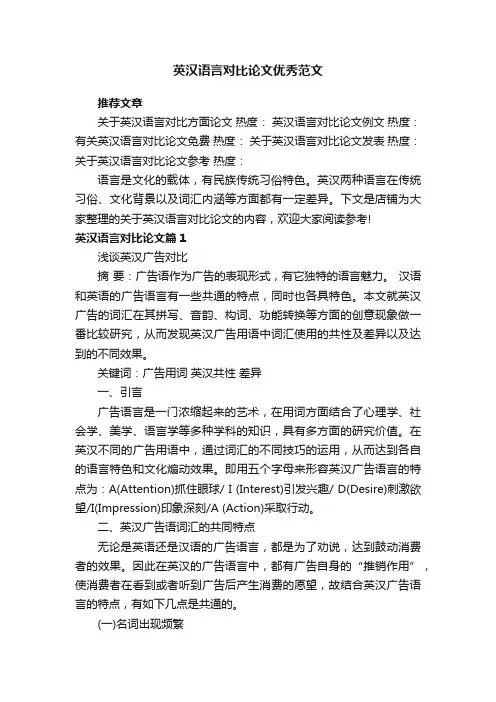
英汉语言对比论文优秀范文推荐文章关于英汉语言对比方面论文热度:英汉语言对比论文例文热度:有关英汉语言对比论文免费热度:关于英汉语言对比论文发表热度:关于英汉语言对比论文参考热度:语言是文化的载体,有民族传统习俗特色。
英汉两种语言在传统习俗、文化背景以及词汇内涵等方面都有一定差异。
下文是店铺为大家整理的关于英汉语言对比论文的内容,欢迎大家阅读参考!英汉语言对比论文篇1浅谈英汉广告对比摘要:广告语作为广告的表现形式,有它独特的语言魅力。
汉语和英语的广告语言有一些共通的特点,同时也各具特色。
本文就英汉广告的词汇在其拼写、音韵、构词、功能转换等方面的创意现象做一番比较研究,从而发现英汉广告用语中词汇使用的共性及差异以及达到的不同效果。
关键词:广告用词英汉共性差异一、引言广告语言是一门浓缩起来的艺术,在用词方面结合了心理学、社会学、美学、语言学等多种学科的知识,具有多方面的研究价值。
在英汉不同的广告用语中,通过词汇的不同技巧的运用,从而达到各自的语言特色和文化煽动效果。
即用五个字母来形容英汉广告语言的特点为:A(Attention)抓住眼球/ I (Interest)引发兴趣/ D(Desire)刺激欲望/I(Impression)印象深刻/A (Action)采取行动。
二、英汉广告语词汇的共同特点无论是英语还是汉语的广告语言,都是为了劝说,达到鼓动消费者的效果。
因此在英汉的广告语言中,都有广告自身的“推销作用”,使消费者在看到或者听到广告后产生消费的愿望,故结合英汉广告语言的特点,有如下几点是共通的。
(一)名词出现频繁由于名词是关键词,不可或缺。
所以,评价一则广告是否妙,是否能达到效果,主要在于是否恰当使用名词。
英汉广告中名词的选用都达到了绝妙的程度,突出了产品的特色、特点和作用。
如:There are many forces that motivate you to run, emotional stability,mental clarity,skinny jeans. Luckily once you motivate to lace up your shoes,the running part has a way of taking care of itself.(Reebok 跑鞋)其中 force,stability,clarity,jeans等从性能、材质的角度说明了该跑鞋的优秀。
英汉语言对比方面论文参考范文语言不是静止不变的,而是会随着时间的变化,受社会因素影响产生变异的特殊符号系统。
下文是店铺为大家整理的关于英汉语言对比方面论文参考范文的内容,欢迎大家阅读参考!英汉语言对比方面论文参考范文篇1浅析语言学习中的英汉对比研究论文关键词:语言学习母语正迁移母语负迁移论文摘要:在二语学习中,学习者的母语会对二语习得产生独特的影响,因此在语言的学习中,要针对其特点,采取对应的方法。
英汉对比教学和学习能有效地降低语言学习中的母语负迁移,更好地发挥母语的正迁移作用。
1 引言二语习得过程中,母语会不可避免地对学习者产生一定的影响。
母语和二语之间的相似之处会促进语言的学习,此现象为母语正迁移;而不同之处将阻碍语言的学习,此现象被称之为母语负迁移。
学习者要有意识地发挥其有利的影响,降低其不利影响。
因此英汉对比研究对二语习得是非常必要的。
2 英汉对比学习的理论依据在二语习得过程中,母语会产生迁移作用,这是被语言学家所证实的事实。
Odlin(2001)这样定义语言迁移,它是一种跨语言的影响,这种影响是由学习者先前习得的语言和目标语之间的相似和差异引起。
语言之间的相似之处有助于二语的习得,这种影响称之为正迁移,而语言之间的差异会阻碍二语的习得,称之为负迁移。
在二语习得过程中,先前习得的语言,一般是母语,已经有了完善的知识结构和牢固的基础,这一特点给二语习得带来的既有积极的作用,同时也会产生负面的影响。
如何发挥其积极作用,减少负面影响是语言学习者有效提高语言学习效率的重要方面。
因此英汉不同之处的对比就变得尤为重要。
3 英汉对比的方面3.1 本体对比3.1.1 大小写方面在汉语中,我们不用考虑汉字的大小写,因为汉字不存在大小写的区别。
而英语的字母则不同,有大小写之分。
以汉语为母语的学习者,由于大小写概念不强,母语的不区分大小写的印象又很深,因此很容易在此方面出错。
英语中一个句子的首字母是必须要大写的,还有一些专有名词,如地名,人名,书名等。
英汉网络语言对比分析研究的论文(五篇范文)第一篇:英汉网络语言对比分析研究的论文随着互联网传播媒介的信息数据的互动共享和互联网社交圈的广泛形成,互联网网络中逐渐形成了各具特色的网络语言。
从语言的类型分类来说,网络语言属于一种社会方言,和形式语言学不同,认知语言学与人们的认知能力、主观思想、社会观念、民族文化心理息息相关,所以从认知语言学的角度来说,英汉网络语言在民族属性和语言属性上的对比会更加鲜明。
傅轶飞编著的《英汉网络语言对比研究》(2013年6月国防工业出版社出版)一书便是一本经典的从认知语言学的角度来对比研究英汉网络语言的专著。
该书有三个研究关键词:“英语网络语言”“汉语网络语言”和“认知语言学”。
前两个是研究对象,后一个是研究方法。
全书一共分为6章,层层递进地论述了英汉网络语言的定义和现状、网络语言的理论基础、英汉网络语言的词汇研究、英汉网络语言的语言特征研究、英汉网络语言的构词规律研究,以及认知上英汉网络语言的对比研究。
这对我国英汉双语语言教学以及英汉文化交流和传播都有着重要的促进作用。
如果用认知语言学的相关知识来对比当前英汉网络语言的发展状况的话,笔者认为必须抓住以下两个方面:一、认知语言学理论中的英汉网络语言共性在认知语言学中,不同民族的语言往往会因为不同的文化心理和群体特性而产生不同,英汉网络语言也是如此,它们都是诞生于自身的文化土壤和交际情境,是互联网中网友约定俗成和互相认同的语言形式,因为其精炼性、趣味性、互动性和引申义而在网络中被广泛使用和传播。
英汉网络语言与其他语言相比,它的认知性更加显著,往往简单的词汇背后可能隐藏着一系列的事件和背景,但从语言的表面形式是很难猜测到网络语言的正确意义的。
也就是说,英汉网络语言的社会认知性都较强,与互联网语言交际实践的环境、心理、文化、事件、使用者都有着密切的关系。
另外,英汉网络语言都有用数字、字母、符号等替代原有字符,如汉语中的“粉丝”(现也指fans),英语中的“Iheartyou”中的“heart”指代“love”。
Growing up in a world where English is spoken as a second language, Ive always been fascinated by the subtle nuances that differentiate the way it is spoken in different countries. The English language, though originating from England, has evolved into various dialects and accents, each with its unique charm and characteristics. My journey to understand these differences has been both enlightening and enriching.As a high school student, I was introduced to British English through literature and media. The sophistication of Shakespeares works, the wit of Oscar Wilde, and the eloquence of Jane Austen captivated me. The way they used language was poetic and elegant, a stark contrast to the more casual American English I was accustomed to. British English, with its precise vocabulary and grammatical structures, seemed to carry a certain gravitas that commanded respect.One of the most noticeable differences between British and American English is the pronunciation. The British accent, with its crisp consonants and distinct vowel sounds, is often associated with formality and sophistication. For instance, the British pronounce the r sound only when it is followed by a vowel, unlike Americans who tend to roll the r more freely. This difference became evident to me when I watched British films and TV shows, where the dialogues were delivered with a rhythm and cadence that was both pleasing and intriguing.Another aspect that sets British English apart is its vocabulary. Certain words that are commonly used in the UK have different equivalents in American English. For example, what Brits call a lorry is known as a truck inthe US, and a flat across the pond is referred to as an apartment. This lexical diversity intrigued me, and I found myself making a conscious effort to learn and use these British terms, feeling a sense of connection to the culture each time I did so.The grammar of British English also intrigued me. The use of the present perfect tense in British English, for instance, is more prevalent than in American English. This subtle distinction in verb tenses added a layer of complexity to the language that I found intellectually stimulating.My fascination with British English led me to participate in a school exchange program, where I had the opportunity to visit the UK. This experience was a turning point for me. Immersed in the culture and surrounded by native speakers, I was able to observe the language in its natural habitat. I noticed how the British use language to convey politeness and social etiquette, often employing indirect speech acts to avoid being too forward or blunt.One memorable incident occurred during a dinner with my host family. When I asked if they could pass the salt, they responded with, Would you mind passing the salt? This indirect way of making a request was a common feature in British English, and it was a stark contrast to the more direct American way of speaking. It was a small but significant insight into the cultural values of politeness and respect for personal space.The British also have a unique sense of humor, often using irony and understatement to great effect. This was something I had to learn toappreciate and understand. Initially, I found it confusing, as the literal meaning of a statement was often the opposite of the intended meaning. But as I became more familiar with this style of humor, I began to appreciate its cleverness and the subtlety with which it was delivered.In conclusion, the differences between British and American English extend beyond mere pronunciation and vocabulary. They reflect the cultural values, social norms, and historical influences that have shaped the way people communicate. My journey to understand these differences has not only deepened my appreciation for the English language but has also broadened my perspective on the world and the diverse ways in which we express ourselves. Its a reminder that language is not just a tool for communication but a reflection of our identities and our cultures.。
中英文差异英语作文The Differences Between Chinese and English Writing。
中英文差异英语作文。
As we all know, Chinese and English are two of the most widely spoken languages in the world. However, there are many differences between the two when it comes to writing. In this essay, we will explore some of the key differences between Chinese and English writing.首先,中文和英文在书写方式上有很大的不同。
中文是一种象形文字,每个汉字都代表一个词汇或概念。
而英文则是一种音标文字,由26个字母组成,每个字母代表一个音素。
因此,学习者需要掌握不同的书写技巧和规则。
Firstly, there are significant differences in the way Chinese and English are written. Chinese is a logographic language, with each character representing a word or concept, while English is an alphabetic language, comprisedof 26 letters, each representing a phoneme. As a result, learners need to master different writing techniques and rules.其次,中文和英文在语法结构上也有很大的不同。
中文的语法结构相对简单,主谓宾的句子结构是最常见的。
请谈谈英语和汉语的差异英文作文全文共6篇示例,供读者参考篇1English and Chinese: A World ApartHi there! My name is Emma, and I'm a 10-year-old student from New York. Today, I want to talk to you about the differences between English and Chinese – two languages that seem worlds apart to me.First things first, let's talk about the writing systems. English uses an alphabet with 26 letters, while Chinese uses thousands of complex characters called hanzi. Learning to write in English is relatively easy – you just have to memorize the letters and how they're combined to form words. But in Chinese, each character represents a word or a part of a word, and you have to learn the strokes and radicals that make up each character. It's like learning a whole new alphabet for every single word!Another big difference is pronunciation. In English, we have a lot of different sounds that we can combine to form words. But in Chinese, the sounds are much more limited, and the meaning of a word depends on the tone you use when you say it. Thereare four main tones in Mandarin Chinese: flat, rising,falling-rising, and falling. If you use the wrong tone, you could end up saying something completely different from what you intended!Speaking of pronunciations, English has a lot of irregular words that don't follow the standard rules of pronunciation. For example, words like "tough," "cough," and "bough" are all spelled differently but sound the same. Chinese, on the other hand, is much more consistent – if you know the sound of a character, you can usually pronounce any word that contains that character correctly.Grammar is another area where English and Chinese diverge. English has a lot of rules for things like verb tenses, subject-verb agreement, and word order. Chinese, however, has a much simpler grammar structure. There are no verb conjugations or gender distinctions, and the word order is generallysubject-verb-object.Despite these differences, both languages have their own beauty and richness. English has a vast vocabulary and a wealth of literature and poetry. Chinese, on the other hand, has a deep cultural significance and a long history dating back thousands of years.Learning a new language can be challenging, but it's also incredibly rewarding. It opens up a whole new world of communication and understanding. As someone who speaks both English and Chinese (albeit with a lot of help from my parents), I can appreciate the unique qualities of each language.In conclusion, English and Chinese may seem like polar opposites, but they both serve as powerful tools for expression and connection. Whether you're a native speaker or a language learner, embracing the differences between these two languages can be a fascinating and enriching experience.篇2My English is Pretty Good, but Chinese is Hard!Hi there! My name is Lily and I'm 10 years old. I go to an international school where we learn in both English and Chinese.I want to tell you about the big differences between these two languages. It's really hard for me, but I'll try my best!First of all, English and Chinese look totally different. English uses the alphabet with 26 letters, but Chinese has thousands of characters instead of letters. I can read and write in English pretty well, but Chinese characters are super hard to learn. My teacher says I have to memorize them one by one. That's a lot of work!In English, we put words together to make sentences. Like "The cat sat on the mat." Easy peasy! But in Chinese, the words don't have spaces between them. It's just one long line of characters smooshed together. How am I supposed to know where one word ends and the next one starts? It's really confusing.The way we make plurals is different too. In English, we usually add "s" to make a word plural, like "one cat" and "two cats." But in Chinese, you don't change the word at all. You just say "one cat" and "two cat." Isn't that weird?Speaking of weird, Chinese has these things called "tones." When you say a word, you have to say it with the right tone. Like saying "ma" with a high, flat, rising, or falling voice. If you use the wrong tone, you could be saying a completely different word! In English, we don't really have tones like that.Another tricky part of Chinese is that sometimes the same word can mean different things. Like the word "kai" could mean "open," "overcome," or "blossom" depending on the character. How am I supposed to remember all those meanings? English is much more straightforward.But you know what's really cool about Chinese? It has measure words! We use them when we're counting things. Likeinstead of saying "three apples," you say "three classmeasureword apples." There are different measure words for books, people, flat things, and long things. Isn't that neat?Oh, and get this - in Chinese, the Subject comes before the Verb, but in English it's the other way around. Like in Chinese you'd say "I today classroom study Chinese," but in English it's "I study Chinese in the classroom today." My head spins just thinking about it!I could go on and on about the differences, but I'm getting tired of writing now. Learning Chinese is pretty hard for me as an English speaker. Sometimes I wish I could just speak one language and be done with it! But my parents say it's really good for my brain to learn both. I guess they're right.Anyways, that's about all I can think of for now. English is my main language and it feels more natural to me. But Chinese is super important too, especially since I live in an international place with people from all over. I'll just have to keep studying hard to master both languages!What about you? Do you speak any other languages besides English? Aren't languages just the craziest things ever? Well, thanks for reading my essay. I'll cai jian!篇3The Differences Between English and ChineseHi there! My name is Lily and I'm in 5th grade. I've been learning English since kindergarten and I think it's a really cool language. But it's also super different from my native language Chinese in a lot of ways. Today I want to share some of the biggest differences I've noticed between the two languages.First up, the way they look and sound is totally different. English uses the Roman alphabet with 26 letters, while Chinese has thousands of logographic characters. In English, we put letters together to make words like "cat" and "dog". But in Chinese, each character represents a whole word or meaning. Like "狗" means dog and "猫" means cat. English words are pronounced using an alphabet too, while Chinese has a very different sound system. I remember learning to pronounce words like "the" and "three" which have those weird "th" sounds that we don't really have in Chinese.The grammar is another big difference. English follows a subject-verb-object order, like "I eat pizza." But Chinese is a subject-object-verb language, so that same sentence would be "I pizza eat." Strange right? There are also tons of little grammarrules in English like where to put articles like "a", "an", and "the" before nouns. Or how to make plurals by adding "-s" or "-es". Chinese doesn't really have those kinds of rules.Then there are the tones in Chinese that don't exist in English at all. Like the word "ma" can mean either "mother", "horse", "scold" or "hemp" depending on which tone you use. English words don't change meaning based on tones. There are also measure words in Chinese like "一本书" which means "one book book". English doesn't use measure words that way.Another cool difference is that Chinese is written horizontally from left to right, just like English. But it can also be written vertically from top to bottom. English is pretty much always written horizontally. And Chinese doesn't use spaces between words, while English does. So English text has lots of spaces but Chinese is just one continuous line or column of characters.I find it really fun to compare the languages because they are so completely different in so many ways. Like night and day! The writing systems, pronunciation, grammar, tones, and even writing directions are totally unalike. But I'm lucky that I get to learn both languages because it helps me understand the world better.I could probably go on and on about the differences, but I'll stop here. Learning multiple languages has taught me that there are many paths to communication and no single "right" way to convey meaning. It makes me appreciate the diversity of human culture and ingenuity. I can't wait to keep learning more about English, Chinese, and maybe even other languages in the future. Who knows what other cool differences I'll discover!篇4Comparing English and ChineseHi there! My name is Emma and I'm a 4th grader. Today I want to talk about the differences between English and Chinese. These two languages are super different in many ways!The first big difference is how they look on paper. English uses the alphabet with 26 letters. Chinese doesn't have an alphabet at all! Instead, it uses thousands of unique written symbols called characters. Just looking at a page in each language, you can see right away which one is English and which one is Chinese.Speaking of characters, that's another huge difference between the languages. In English, we have words made up of letters put together. In Chinese, there is often one character thatrepresents an entire word meaning. So English words are built from letters, while Chinese words are made from characters. That's wild!It also means there are way more characters to learn in Chinese compared to letters in English. I only had to learn 26 letters growing up with English. My friend Mei who speaks Chinese has to learn thousands of characters! That seems so hard. I'm glad I learned English first.The way words are formed is really different too. In English, we string letters together to make words like "cat" or "run." In Chinese, the characters get combined in different ways. Sometimes it's two characters side-by-side making a word. Other times, the characters get stacked up one on top of the other. My Chinese friend says it's kind of like building blocks. You put the pieces together in a certain way to create words. It reminds me of Lego bricks!Another major difference is how we write English vs. Chinese. For English, we write horizontally from left to right in rows. Super simple! But in Chinese, you can write vertically from top to bottom in columns, or you can write horizontally from left to right just like English. My friend Mei showed me some examplesof vertical Chinese writing and it looked so bizarre to me! We don't ever write English that way.The tones each language uses are really different too. In English, we don't really use tones at all. We just say words with a regular pitch. But in Chinese, the tone you use for saying a word is super important. Using the wrong tone can completely change the meaning! My friend Mei gave me some examples where the same sound meant different things just based on changing the tone. Like the sound "ma" could mean "mother," "horse," "scold," or "hemp" depending on the tone. That's so confusing to me as an English speaker. I'm used to words just having one pronunciation and meaning. The tones in Chinese make it way harder in my opinion.I also think grammar is a lot simpler in English compared to Chinese. We have basic sentence structures likesubject-verb-object that are pretty straightforward. Chinese has some similar concepts but also many unique grammar rules that seem super complicated. Like there are special LE particles, different classifiers for counting objects, and specific position words. My Chinese friend tries to explain it to me but my eyes just glaze over! English grammar just makes more sense to my brain.On a positive note, English is way harder when it comes to spelling words correctly. We have so many weird spelling rules and exceptions. Words don't phonetically sound the way they are spelled a lot of the time. Meanwhile, Chinese words are spelled exactly the way they sound based on the characters. So in that way, Chinese is simpler than English spelling.Overall though, I think English seems easier than Chinese in most ways. Don't get me wrong, English can be confusing too! But just looking at the crazy amount of characters, tones, and grammar rules in Chinese makes me grateful I'm a native English speaker first. It seems like such an intricate and complex language. I have so much respect for people who can speak, read, and write Chinese fluently. It's pretty amazing if you ask me!Those are just some of the key differences I've noticed between English and Chinese so far. Maybe my perspective will change as I get older and study both languages more. But for now as a 4th grader, Chinese appears wayyyy more difficult and confounding than good ol' English. I'm proud to know English as my native tongue! Hopefully this gave you some insight into how an elementary student views these two extremely different world languages. Thanks for reading!篇5The Differences Between English and ChineseEnglish and Chinese are two very different languages. I have been learning English since I was very young, and I've noticed many ways that English is different from my native language of Chinese.One of the biggest differences is the writing systems. English uses an alphabet with 26 letters to write words. Chinese has thousands of characters, with each character representing a word or part of a word. Learning to read and write Chinese is very difficult because there are so many characters to memorize. In English, once you learn the sounds the letters make, you can read and write almost any word just by sounding it out.The grammar is also quite different between the two languages. In English, you have to make sure your verbs agree with the subject. You say "I am" but "they are." You also have to worry about tenses, like past, present and future. Chinese grammar is not as complicated in that way. The verbs don't change based on the subject or tense. Instead, we use helpers words to indicate time.Another grammar difference is that English has a strict subject-verb-object word order, while Chinese is more flexible. In Chinese, we can say "I apple eat" and it would still make sensebased on the context. English doesn't allow that kind of flexibility.The pronunciation and tones are super different too. English is not a tonal language, so the way you say a word doesn't change its meaning. But in Chinese, the same sounds can mean completely different things based on which tone you use. For example, "ma" can mean "mother," "horse," "scold" or "numb" depending on whether you say it with a high, rising, falling, or flat tone.English also has many irregular verbs, nouns and adjectives that you just have to memorize. For example, the past tense of "go" is "went" and the plural of "mouse" is "mice." Those don't follow the normal rules. Chinese is more consistent and logical in that sense.In English class, we spend a lot of time learning idioms and expressions that can't be understood literally. Things like "it's raining cats and dogs" or "let the cat out of the bag." Those have special meanings you just have to learn. Chinese has some idioms too, but not as many weird ones as English.I find English pronunciation quite difficult compared to Chinese. English has so many vowel sounds and consonant combinations that don't exist in Chinese. Words like "squirrel" or"through" are really tough to say properly as a Chinese speaker. And the "r" and "l" sounds get me every time!On the other hand, English is more simple in other ways. You only have to worry about capitalizing proper nouns and starting sentences. In Chinese, there are rules for writing different kinds of people's names, place names, and book titles with the right characters.Another tricky part of English is the articles - when to use "a," "an" or "the." Chinese doesn't have articles, so we often leave them out when speaking English. And I always get confused about when to use "him" versus "his" or "she" versus "her."One area where Chinese is harder is that we have to learn two sets of characters and pronunciation - simplified and traditional. Mainland China uses the simplified characters, while Taiwan and Hong Kong use the traditional ones. So we have to study both.Despite the many differences, there are a few similarities between English and Chinese. They both have basic sentence structures with a subject and a predicate. They have similar concepts of nouns, verbs, adjectives, and adverbs (although the rules differ). And we use similar punctuation like periods, commas, and question marks.Overall, I definitely find English more challenging than my mother tongue of Chinese. But I know learning this important world language will open up many opportunities for me in the future. With lots of practice and hard work, I'm sure I can become just as fluent as a native speaker. Until then, I'll just have to be patient with myself as I navigate the tricky terrain of English grammar, pronunciation and idioms!篇6English and Chinese: Two Very Different LanguagesHi! My name is Emily and I'm 10 years old. Today I want to talk to you about the differences between English and Chinese. You see, my mom is American and only speaks English, but my dad is from China and speaks Chinese. So at home, I get to experience both languages every day!The first really obvious difference is how the languages look and sound. English uses the alphabet with 26 letters to make words. The letters are: A, B, C, D, E, F, G, H, I, J, K, L, M, N, O, P, Q, R, S, T, U, V, W, X, Y, Z. We put the letters together to spell words like "cat", "dog", "run", "happy".But Chinese looks totally different! Instead of an alphabet, it uses thousands of complex characters or symbols. Someexamples are: 你, 好, 中, 国. Each one represents a whole word or concept. It's kind of like little pictures almost. So while English words are built from letters, Chinese words are built from characters.The sounds are also super different. English has a smaller range of sounds using just the letters of the alphabet. But in Chinese, the same characters can have completely different meanings just by changing the tone! There are four main tones in Mandarin Chinese. It's kind of like singing words sometimes.Speaking of tones, another huge difference is that English is flat without any tones, while Chinese is a tonal language. In English, you say "ma" the same way no matter what. But in Chinese, "ma" with a flat tone means "mother", but "má" with a rising tone means "hemp"! Crazy right?Grammar is also completely opposite in the two languages. In English, we have a strict subject-verb-object word order. Like "I eat rice" - with "I" as the subject, "eat" as the verb, and "rice" as the object.But Chinese grammar is totally backwards! The verb comes after the object, so that same sentence would be "I rice eat". And you also don't have to include little words like "a", "the", etc. It's more simple that way.There are also no plurals in Chinese! In English if we want to say multiple of something, we add -s or -es to make it plural, like "one dog" but "two dogs". But in Chinese, you just say "one dog" and "two dog". Context matters more than specific plurals.Another weird difference is that Chinese has measure words before a noun. Like you can't just say "three book", you have to say "three classifier book" with a specific measure word before the noun. For example, you'd say "three ben book".One more big difference is that Chinese doesn't have spaces between words! The characters are all smushed together in a long string. So you have to know where one word ends and the next begins based on context. Wheras English has nice spaces to separate each word.Those are some of the biggest differences between English and Chinese that I've noticed. Writing is also super different - English goes left to right horizontally, while Chinese can go vertically top to bottom too. And there are way more homophones in Chinese where tons of words sound the same.So in summary, English follows more consistent rules for spelling, plurals, word order and is more phonetic. While Chinese has way more characters, tones, measure words and relies moreon context. The sounds, grammar and writing systems are like night and day!。
关于英汉翻译的论文英语和汉语是两种高度发展的语言,对比其异同,对于英语翻译教学是很重要的。
下文是店铺为大家整理的关于英汉翻译的论文的范文,欢迎大家阅读参考!关于英汉翻译的论文篇1英汉语言的异同及其翻译策略在英汉翻译中,两种语言在词汇方面的不同主要体现在词的意义,词的顺序和词的搭配能力三个方面;从句法方面来说,英语和汉语在句子结构,句子顺序和其他一些表达方式上则有各自的特点。
下面笔者就从词汇现象和句法现象两方面来探讨英汉的对应程度如何,以及根据这些对比,在进行翻译实践时,应该运用哪些翻译技巧。
1、英汉语言的对比1.1英汉词汇现象的对比首先,从词的意义方面来看。
词汇作为语言的三要素之一,相比于语音和语法,它的变化最快。
随着社会和科学的不断发展和变化,在语言中一方面增加了新词,一方面旧词增添了新的意义。
人类发明轮船以前,用的是帆船,英语“sail”一词原意为“帆”,短语“setsail”,就有张帆起航之意。
但是随着社会的发展,帆船逐渐被用煤,柴油,甚至是用核动力的轮船所代替。
自从潜艇出现后,“sail”这个词又增添了“潜艇指挥塔”的新含义。
这就是词义的发展变化,我们在对比英汉语言时,应该明确它们的对应情况是随着时间的变迁和社会的发展而发展变化着的。
英语词汇在汉语里的对应程度,大致可以归纳为四种情况。
第一,完全对应。
英语中的词所表达的意义,可以在汉语里找到完全对应的词来表达。
如“computationallinguistics”(计算语言学),“TheU.S.StateDepartment”(美国国务院)。
这主要是一些已有通用译名的专用名词,术语和生活中常见事物名称等。
第二,部分对应。
英语中有些词和汉语中的词汇在词义上只能部分对应,体现在有广义和狭义之分。
如“morning”(上午,早晨),“gun”(枪,炮),一个英语单词相对应有较多的汉语意义.第三,无对应。
英语中有些词或汉语里有些词在对方语言里找不到对应的词来表达。
英汉语言对比论文范文语言是文化的载体,有民族传统习俗特色。
英汉两种语言在传统习俗、文化背景以及词汇内涵等方面都有一定差异。
关于英汉语言对比的论文如何写呢?英汉语言对比论文:浅谈英汉广告对比摘要:广告语作为广告的表现形式,有它独特的语言魅力。
汉语和英语的广告语言有一些共通的特点,同时也各具特色。
本文就英汉广告的词汇在其拼写、音韵、构词、功能转换等方面的创意现象做一番比较研究,从而发现英汉广告用语中词汇使用的共性及差异以及达到的不同效果。
关键词:广告用词英汉共性差异一、引言广告语言是一门浓缩起来的艺术,在用词方面结合了心理学、社会学、美学、语言学等多种学科的知识,具有多方面的研究价值。
在英汉不同的广告用语中,通过词汇的不同技巧的运用,从而达到各自的语言特色和文化煽动效果。
即用五个字母来形容英汉广告语言的特点为:AAttention抓住眼球/ I Interest引发兴趣/ DDesire刺激欲望/IImpression印象深刻/AAction采取行动。
二、英汉广告语词汇的共同特点无论是英语还是汉语的广告语言,都是为了劝说,达到鼓动消费者的效果。
因此在英汉的广告语言中,都有广告自身的“推销作用”,使消费者在看到或者听到广告后产生消费的愿望,故结合英汉广告语言的特点,有如下几点是共通的。
一名词出现频繁由于名词是关键词,不可或缺。
所以,评价一则广告是否妙,是否能达到效果,主要在于是否恰当使用名词。
英汉广告中名词的选用都达到了绝妙的程度,突出了产品的特色、特点和作用。
如:There are many forces that motivate you to run, emotional stability,mental clarity,skinny jeans. Luckilyonce you motivate to lace up your shoes,the running part has a way of taking care of itself.Reebok 跑鞋其中force,stability,clarity,jeans等从性能、材质的角度说明了该跑鞋的优秀。
当然,在中文广告中也不乏使用名词的例子,如:以美妙动听的音乐带给儿童快乐的时光!电子琴广告二口语化,大众化广告语不会很死板、书面,而是灵活地使用我们日常交流的口语,这样会突出商品的亲和力。
在英语广告中,英语口语甚至俚语也会大量涌现。
如:Good to the last drop.麦斯威尔咖啡广告Is microwave cooking fast?――You bet!微波炉广告。
这两则广告恰当地运用了俚语gotta 及youbet,这在一定程度上增强了广告的亲和力,使得该广告活像一个客户的经验之谈,颇有感染力。
汉语广告中也出现使用口语的情况,比如采用各地具有标志性的方言,如:顺滑咧。
飘影洗发水广告喝了娃哈哈,吃饭就是香!娃哈哈营养液这些妙语连珠的广告语具有街头巷尾的风格,土得可爱,更有亲切感,更有说服力。
三引用外来词汇我们会发现在英语的广告中特别是宣传香水、包包等高档产品或拥有外国风味的产品时,会经常引用别国语言来加强广告的传播效果。
在英文广告中如一则香水广告:Perries...with added je ne sais quoi.其中“Jen e sais quoi” 对应的英语为“I don’t know what”。
同样,在汉语广告中也出现了越来越多的英文缩略词,如VCD,DVD,PIV管道等等。
其一是因为随着我国科技的发展,大众已经接触到越来越多的国外进口产品,并已经熟知这些英文缩略语所代表的意义。
其二,使用这种外来语会使消费者觉得产品科技含量较高,能产生信任感。
四词语省略在英汉广告中,还有一个共同的现象,那就是词语省略。
这是为了使广告简洁精练。
从生产商的角度来说,也可以压缩篇幅降低成本费用,只要不产生歧义。
这样的例子也有很多。
如:1Easy to make, easy to show,hard tobelieve.2爱献春城,利给群众,价格最低,质高无尚!电器行广告在英汉广告中,必要时部分短语或单词的省略大有裨益,不仅可以简缩篇幅,成本得以降低,而且可增强广告的节奏韵律感,如此便可一举数得。
三、英汉广告语中所用词汇的差异英汉广告由于英语和汉语属于迥然不同的语系、语言背景及国家文化的原因,所以二者存在许多差异,尤其体现在词汇的运用上。
一英语广告通过特殊构词法创造新词1.自由合成法例如Timex Watch的广告语:Give a Timex to all, to all a good time. 其中Timex由time及excellent合成而来,前缀ex-彰显产品性能优良。
又如:The Orangemostest Drink in the world. orange+most+-est便得到Orangemostest,orange之后连加了两个最高级,橘汁的美味可见一斑。
诸如此类的广告制作方式多得不胜枚举,通过运用构词法等构成新词,这样会增强广告新意。
2.故意错拼英文广告常以故意错拼来增强吸引力。
新词与原词在形式上不同,但在原意义存在的基础上反而会增加一些新的意义,更为引人注目,有助于传播商品信息。
例如:TWOGETHER, the Ultimate All Inclusive One Brice Sun kissed Holiday Beach.海滨度假村广告在这个度假村广告里将单词together故意错拼成了twogether,广告特意将“to”错拼为”two”,是为了强调夫妻二人一起甜蜜地享受快乐假日。
这为广告增添了一种温馨和幸福。
3.缩略法由于缩略语显著性强,大量空间得以节省,而且符合广告文案的经济原则,缩略语会在商品的商标中频繁出现。
英语中用缩略语的例子有:KFC Kentuchy Fried Chicken,IBM电脑商标IBM International Business Machines Corporation。
4.运用类比构词我们所说的仿词辞格即为类比构词,该构词方式有趣且实用,为广告语增添了一分独特别致的生趣,广告词在散发造词艺术的同时产生了诱惑读者的效果。
如:Gatorade is Thirst Aid.开特力饮料广告广告制作者把“Thirst Aid” 类比为大家熟知的“First Aid” 急救,大幅度夸张了开特力饮料的止渴功能,大大增加了对消费者的诱惑力。
而汉语的构词特点由于汉语的构词法不同,其在广告语中的构词特点也与英文广告语的构词有很大差距。
下面本文将分析汉语广告语中的构词法来展示汉语广告语词汇与英语广告所用词汇的不同之处。
二汉语广告语构词的创意来自于汉字构形和字音1.离合汉字法如丰田广告将“丰”、“田”两字组合成为“车”的繁体字,巧妙地表明了广告主题“丰田就是车,车就是丰田”。
另外,将“森”字一路分解得到“十字架”如:森―林―木―十,委婉点题“破坏森林,人类将给自己造成灾难”,巧妙而富有创意。
2.描绘字形法如香港一家广告公司DDB在虎年贺岁广告中巧妙地描绘了“彪”字,“彪”在传说中为长翅膀的老虎,以此表达采用DDB的广告,会达到“如虎添翼”的效果,使观众耳目一新,创意十足。
3.删减字形法“歪孬甭”表面看起来拗口,但蕴含妙义,这三字中带有三个“不”字,如果去掉,成为“正好用”,如此巧妙的删减字形,很贴切地描述出书写改正液及贴纸的产品功能。
4.谐音法汉字有一大特点即一音多字多义,即为汉语广告中经常采用的谐音。
如一个洗浴中心的广告――洗乐年华,巧妙将“喜”改为“洗”,风趣新奇,既紧扣了洗浴中心“洗”的服务,也暗示了此处会带来舒心服务,让顾客开心。
四、结论可以看出,英汉两种语言所承载的文化背景不同,由此造成语言形态便相去甚远,但这些不同无法阻止在广告语言艺术上对美的共同追求。
为了达到共同的目的,在英汉的广告语言中用词都简单易懂,口语化,使用名词等来增加广告的吸引力和说服力。
当然由于两种语言属于不同语系,语言的发展及构成也有很大差异,导致英汉广告用词也存在一些差异。
如英语会采用混合构词法、仿拟法等等来使得广告有创意。
而汉语中会采用字的离合、字形增减、描绘等来体现广告的主题,增添新意。
本文只从微观的词汇层面进行了英汉广告的初步比较,而博大精深的广告文化等更多层面都值得我们去做进一步的探讨和研究。
参考文献[1] 黄蔷.论英语广告的词汇[J].重庆工学院学报,2021, 1910:111-113.[2] 段胜峰.英汉广告的词汇创意[J].中国科技翻译,2001, 142:23-25.英汉语言对比论文:浅谈英汉对比法律语言变异性研究摘要:法律语言是一种具备特殊语言交际功能的应用性语言,而作为在不同国家不同背景下使用的法律语言,英语和汉语之间又有很大的不同。
本文依据拉波夫社会语言学语言变异理论,从语域外与语域内两个角度探究了法律语言产生变异的原因,并揭示了英汉两种语言变异的现象,对汉语的法律语言进一步完善有一定的指导作用。
关键词:法律语言;语言变异;英汉对比1 概述语言不是静止不变的,而是会随着时间的变化,受社会因素影响产生变异的特殊符号系统,由美国语言学家拉波夫开创的语言变异研究languagevariation是社会语言学领域的重要理论之一。
法律语言是一种具备特殊语言交际功能的应用性语言。
然而,一些语言学者曾质疑“法律语言”这种说法的合理性,他们认为“法律语言”是民族大众语的一部分,不能称作一门独立的语言而存在。
确实,法律并没有使用完全区别于民族大众语的独立语言,但是,廖美珍教授指出,“法律语言具有不同于民族大众语的其自身的显著特点。
正是这些显著的特点足以将从事法律活动的语言称之为‘法律语言’”。
为了法律交际和发展的需要,法律语言作为民族大众语言的一种语言变体,在发展的过程中,形成了与民族大众语言不同的发音、语法或词汇。
无论在中国还是在西方国家,这种发生在法律语言上的变化都是一个漫长的过程且值得关注的。
本文主要研究的是在英汉两种法律语言中形成此种变异的原因、现象与影响,拟通过对比英汉两种法律语言在语音、语法等具体语言因素上的异同,探究揭示法律语言的变异规律及其本质特征,以期对汉语的法律语言之完善起到些微作用。
2 引起法律语言变异的原因语言变异指因情景、话题、说话对象和地点等外界因素的不同而改变的口语或书面语形式,表现在语音、词语、句子结构等语言形式的变化。
语言变异受到物质环境和语言结构因素的很大限制,不过引导语言变化更为重要的力量来自于社会。
相较于民族大众语,法律语言则是一种语域,是特定社会群体,即法律人使用和掌控的一种专门技术语言。
因法律的专业性,以及法律人较高的社会地位,也可以说,法律语言是一门精英语言。